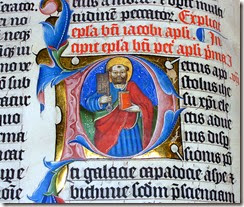
The text is the beginning of the First Epistle of Peter.
The illumination is a capital letter P since the letters following are ETRUS, making the word PETRUS (Peter in Latin).
Pick up your Bible, please, and turn to II Peter’s first chapter. Instead of putting his name at the end of the letter, Peter identifies himself, then addresses the recipients:
to them that have obtained like precious faith with us through the righteousness of God and our Saviour Jesus Christ:
He shares the same precious faith – not just “in”, but “through the righteousness” of both the Father and the Son:
Grace and peace be multiplied unto you through the knowledge of God, and of Jesus our Lord,
He prays for those to whom he is writing – that they may know God and receive multiple portions of His grace and peace. He then acknowledges that all we have comes from God:
According as his divine power hath given unto us all things that pertain unto life and godliness,
We do have to know Him, and understand that He calls:
through the knowledge of him that hath called us to glory and virtue:
Of great importance are God’s promises:
Whereby are given unto us exceeding great and precious promises:
Through these promises we receive precious gifts:
that by these ye might be partakers of the divine nature,
But we do have to leave something behind:
having escaped the corruption that is in the world through lust.
All of that in just the first four verses! The next three verses are all actions for us to complete:
And beside this, giving all diligence, add to your faith virtue; and to virtue knowledge; And to knowledge temperance; and to temperance patience; and to patience godliness; And to godliness brotherly kindness; and to brotherly kindness charity.
When we do this adding, we move closer and closer to our Lord’s will in our lives – and end up with the type of love that only comes between God and man. Paul in I Corinthians’ “love” chapter, 13, calls charity “the greatest of these.” That’s our goal – the charity of God’s love for mankind – and the love we give in return. When we know this, we will bear fruit:
For if these things be in you, and abound, they make you that ye shall neither be barren nor unfruitful in the knowledge of our Lord Jesus Christ.
Not all of us accomplish this goal. Peter recognizes this, too:
But he that lacketh these things is blind, and cannot see afar off, and hath forgotten that he was purged from his old sins.
In my own opinion, once we’ve forgotten that we were cleansed from old sins, we not only repeat them but create new ones. We fall. Peter has a solution to that, too:
Wherefore the rather, brethren, give diligence to make your calling and election sure: for if ye do these things, ye shall never fall:
(2 Peter 1:1-10 KJV)
The application of these ten verses in our own lives is not as easy as they read – but the truth contained in them is valid. When we do diligently gain knowledge of Christ, adding faith and virtue while remembering we were cleansed of old sins, we will not fall.
The other side of the coin is just as true. When we become complacent, resting only on our current knowledge without building our faith, without bearing the fruit of good works from it, we will certainly fall.
Ten verses. Not even a full chapter, yet the application of these changes our lives.
No comments:
Post a Comment
Thank you for taking time to read and comment on the blog. Comments should take into consideration this verse: Finally, brethren, whatsoever things are true, whatsoever things are honest, whatsoever things are just, whatsoever things are pure, whatsoever things are lovely, whatsoever things are of good report; if there be any virtue, and if there be any praise, think on these things. (Philippians 4:8 KJV)